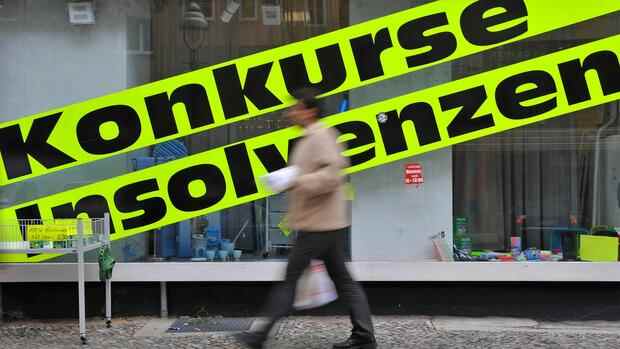Economic expert Veronika Grimm spoke of an extremely challenging situation, “since we cannot currently assume that we will return to the old world after this price shock”. The transformation to climate neutrality will accelerate, Grimm told the Handelsblatt. “Many companies will lose their business model faster than originally thought.” The energy crisis is accelerating market exits – i.e. insolvencies or operational closures – which would have been expected anyway.
The economist Michael Hüther referred to the findings of a study by the industry association BDI, according to which the existence of 34 percent of medium-sized companies is at stake in view of the increased prices for energy and raw materials. That is “certainly plausible,” said the director of the German Economic Institute (IW) to the Handelsblatt. “In fact, we are moving towards a tipping point.” The companies would get “acute liquidity problems”.
This could result in a wave of bankruptcies. But that cannot be said with absolute certainty. The most recent insolvency figures from the Federal Statistical Office are not very meaningful in this regard. An upward trend is not discernible. In August there were more so-called regular insolvencies than in July. In the first half of the year, the number of bankruptcies had decreased. The IWH Institute expects more bankruptcies from autumn onwards because of the rising prices.
Top jobs of the day
Find the best jobs now and
be notified by email.
The toilet paper manufacturer Hakle filed for bankruptcy last week, followed by the shoe retailer Görtz and the car supplier Dr. Cutter. More and more ailing companies are currently looking for help from restructuring experts, said Lucas Flöther, who became known as the administrator of Air Berlin and Condor. However, he does not expect a wave of bankruptcies in the short term. Some of the problems stemmed from the Corona period. “And this crisis is now being overshadowed by other crises.”
Economics Grimm pleads for targeted help
Creditreform expert Hantzsch sees it similarly. A real wave of bankruptcies is currently not foreseeable, he said. Like Flöther, Hantzsch also attributes this to the fact that there is still a backlog of insolvencies from the Corona period.
>> Read also: Is there a wave of bankruptcies? These are the most important questions and answers
The state Corona aid measures have “artificially” prevented insolvency in many companies. These companies, some of which are badly hit, are now encountering a “highly volatile environment” with high inflation, skyrocketing energy prices, rising interest rates, a lack of employees and disrupted supply chains.
Hantzsch warned against saving every company with state aid. In an economy based on market economy principles, companies with unprofitable business models would also have to take the path of insolvency.
Hantzsch also pointed out that there would be no return to the pre-Corona era for companies. The coming years would be shaped by a wide variety of crises and challenges that would put existing business models to the test. “Therefore, it must be the task of politicians not only to prevent any bankruptcy at all costs and to pump money into the market,” warned the expert.
That can only combat the symptoms in the short term. In the current energy crisis, “particularly affected” sectors should rather be identified and promoted. “At the same time, investment incentives must be created that do not support companies, but rather strengthen their innovative strength and promote competitiveness.”
The economics of Grimm also advocates targeted aid. “In cases where the business model will be retained in the future, the liquidity bottlenecks should be bridged, ideally with loans,” said the economist.
Scholz promises companies to expand the aid measures
Grimm thinks little of a renewed expansion of the loss carryback. With the help of this instrument, companies can offset losses from a financial year against profits from previous years to a large extent. That shouldn’t help, Grimm believes, because the situation due to the corona pandemic is already tense in many cases.
>> Read also: Stadtwerke in distress – after gas traders, smaller suppliers are also getting into difficulties
Grimm also does not consider it necessary to cushion energy costs on a large scale. “Because companies can certainly pass on the costs to customers or have leeway to cushion them,” she said. The situation is different for companies that only have to stop production temporarily, for example to avoid a gas shortage. They should receive bridging assistance and have access to short-time work.
Chancellor Olaf Scholz (SPD) assured the companies that the aid measures would be expanded. He said on Tuesday at the Employers’ Day in Berlin that the government is working flat out to strengthen the existing programs.
According to information from the Handelsblatt, the federal government is already planning new aid for ailing energy supply companies. According to this, the state development bank KfW is to be strengthened – for example in securing guarantees and in providing liquidity support for the companies concerned.
The Ministry of Finance therefore intends to use existing credit authorizations from the Corona rescue fund for KfW. It is about a total volume of 67 billion euros.
It is also planned that when checking for over-indebtedness, companies will only have to prove that they can only continue operations for four months instead of the previous twelve. “Who can look twelve months into the future in these uncertain times?” said Justice Minister Marco Buschmann (FDP).
More: The EU wants to skim off the profits of oil and gas companies
